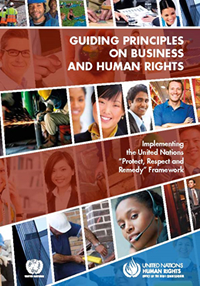Corporate human rights due diligence – identifying and leveraging emerging practices
Working Group on Business and Human Rights
Background

The unanimous endorsement of the Guiding Principles on Business and Human Rights by the United Nations Human Rights Council in 2011 represented a watershed moment in efforts to tackle adverse impacts on people resulting from globalization and business activity in all sectors. They provided, for the first time, a globally recognized and authoritative framework for the respective duties and responsibilities of Governments and business enterprises to prevent and address such impacts.
The Guiding Principles clarify that all business enterprises have an independent responsibility to respect human rights, and that in order to do so they are required to exercise human rights due diligence to identify, prevent, mitigate and account for how they address impacts on human rights.
Corporate human rights due diligence
Human rights due diligence is a way for enterprises to proactively manage potential and actual adverse human rights impacts with which they are involved. It involves four core components:
(a) Identifying and assessing actual or potential adverse human rights impacts that the enterprise may cause or contribute to through its own activities, or which may be directly linked to its operations, products or services by its business relationships;
(b) Integrating findings from impact assessments across relevant company processes and taking appropriate action according to its involvement in the impact;
(c) Tracking the effectiveness of measures and processes to address adverse human rights impacts in order to know if they are working; and
(d) Communicating on how impacts are being addressed and showing stakeholders – in particular affected stakeholders – that there are adequate policies and processes in place.
Enterprises should identify and assess risks by geographic context, sector and business relationships throughout own activities (both HQ and subsidiaries) and the value chain.
The prevention of adverse impacts on people is the main purpose of human rights due diligence. It concerns risks to people, not risks to business. It should be ongoing, as the risks to human rights may change over time; and be informed by meaningful stakeholder engagement, in particular with affected stakeholders, human rights defenders, trade unions and grassroots organizations. Risks to human rights defenders and other critical voices need to be considered.
Working Group report on human rights due diligence
In its report to the 2018 UN General Assembly, the Working Group on Business and Human Rights highlights key features of human rights due diligence and why it matters; gaps and challenges in current business and Government practice; emerging good practices; and how key stakeholders — States and the investment community, in particular — can contribute to the scaling-up of effective human rights due diligence.
Working Group presentation to the 2018 UN General Assembly - Corporate human rights due diligence: emerging practices, challenges and ways forward.
Human rights due diligence in practice is a major focus of the 2018 UN Forum on Business and Human Rights.
Key documents
- Working Group report on human rights due diligence to the 2018 General Assembly (available in Arabic, Chinese, English, French, Spanish and Russian)
- Executive summary of the Working Group report on human rights due diligence
- Companion paper I – Corporate human rights due diligence: Background note and elaborating on key aspects
- Companion paper II – Corporate human rights due diligence – Getting started, emerging practices, tools and resources
- Overview of references to human rights due diligence in existing State national action plans on business and human rights
- UN Guiding Principles on Business and Human Rights
- The Corporate Responsibility to Respect: An Interpretive Guide (Office of the UN High Commissioner for Human Rights)
Consultations on human rights due diligence
Starting in February 2018, the Working Group conducted a consultation process to inform its work on this topic. This process included a range of stakeholders (including business, civil society and governments) through in-person consultations and written inputs.
- Background note
- An open multi-stakeholder consultation was held in Geneva on 17 May 2018. Concept note.
- Submissions: all interested parties were invited to submit relevant material and information to the Working Group. Received inputs are posted here
To receive updates via Twitter, please follow @WGBizHRs